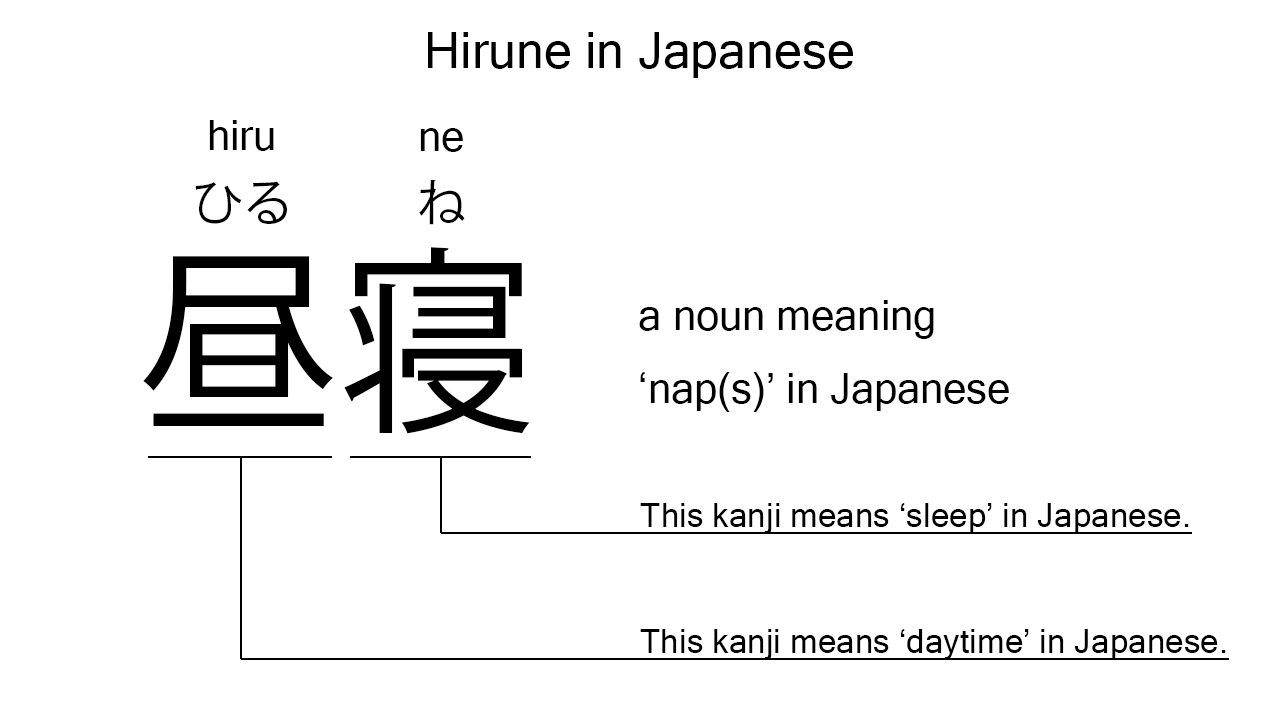What does “hirune” mean in Japanese?
Native speakers say “hirune” to mean ‘nap’ in Japanese. Perhaps, some Japanese learners know this word as it is sometimes used in Japanese movies, novels, manga, anime, and the like. In this blog post, however, I will explain this word in detail based on its kanji expression. And also, I will explain how to use it through example sentences. My explanations would help Japanese learners understand “hirune” more clearly. Then, let’s get started!
Contents
Definition and meaning of “hirune”
Let me start with the definition and meaning of “hirune”.
- hirune – 昼寝 (ひるね) : a noun meaning ‘nap’ in Japanese. This can also work as plural. Learn more about Japanese plural.
The definition and meaning are simple and clear. To understand this noun more clearly, however, let me explain its kanji characters in detail, one by one.
What does “hirune” literally mean in Japanese?
The kanji expression of “hirune” consists of the following two kanji characters:
- 昼 : a kanji character widely used to mean ‘midday’ or ‘daytime’ in Japanese. This kanji can also be found in other words like “ohirugohan“.
- 寝 : a kanji character widely used to mean ‘sleep’ in Japanese. This kanji can also be found in other words like “neru“.
From these two kanji characters, we can understand that the formed noun literally means ‘daytime sleep’ in Japanese. This literal interpretation is very close to the actual meaning.

When we meet new kanji expressions, we should check their kanji characters in detail to understand their meanings clearly and deeply. In many cases, kanji characters tell us a lot about the meanings of the expressions they form. Actually, here, we could get the better understanding of “hirune” through the detailed kanji check above.
So far, I’ve explained the definition and meaning of “hirune” together with its kanji characters. Then, let me explain how to use it through the example sentences below.
Example #1: how to say “take a nap” in Japanese
kanojo wa tokidoki hirune wo suru – 彼女は時々昼寝をする (かのじょはときどきひるねをする)
She sometimes takes a nap.
Below are the new words used in the example sentence.
- kanojo – 彼女 (かのじょ) : a pronoun meaning ‘she’ in Japanese.
- wa – は : a binding particle working as a case marker or topic marker. In the example, this works after “kanojo” to make the subject in the sentence.
- tokidoki – 時々 (ときどき) : an adverb of frequency meaning ‘sometimes’ in Japanese.
- wo – を : a case particle used to make the object word in a sentence. In the example, this is used after “hirune” to make the object in the sentence.
- suru – する : a verb meaning ‘to do’, ‘to perform’, or such in Japanese.
This is a typical usage of “hirune”. In this example, it works as a part of the commonly-used phrase, “hirune wo suru”, which is often translated into English as ‘to take a nap’. In Japanese, this phrase literally means ‘to do a nap’, though.
Example #2: another usage of “hirune”
watashi mo yoku hirune wo shi masu – 私もよく昼寝をします (わたしもよくひるねをします)
I often take a nap, too.
Below are the new words used in the example sentence.
- watashi – 私 (わたし) : a pronoun meaning ‘I’ in Japanese.
- mo – も : a binding particle making the subject word or the object word in a sentence with adding the meaning of ‘also’, ‘as well’, or ‘too’. In the example, this works after “watashi” to make the subject in the sentence with adding the meaning of ‘too’. Learn more about the phrase, “watashi mo“.
- yoku – よく : an adverb of frequency meaning ‘often’ in Japanese.
- shi – し : one conjugation of the verb, “suru”, which has been explained in the last example. In this example, it has been conjugated for the better connection with its following word.
- masu – ます : an auxiliary verb used after a verb to make it polite. Probably, this is well known as a part of Japanese masu form. In the example, this is used after “shi” to make it sound polite.
This is another typical usage of “hirune”. When we want to mean a ‘nap’ or ‘naps’ in Japanese, this noun is always a very good option.
Summary
In this blog post, I’ve explained the definition and meaning of “hirune” in detail based on its kanji expression. And also, I’ve explained how to use it through the example sentences. Let me summarize them as follows.
- hirune – 昼寝 (ひるね) : a noun meaning ‘nap’ in Japanese. These two kanji characters mean ‘daytime’ and ‘sleep’ respectively, so this noun literally means ‘daytime sleep’ in Japanese. This literal interpretation is very close to the actual meaning.
Hope my explanations are understandable and helpful for Japanese learners.